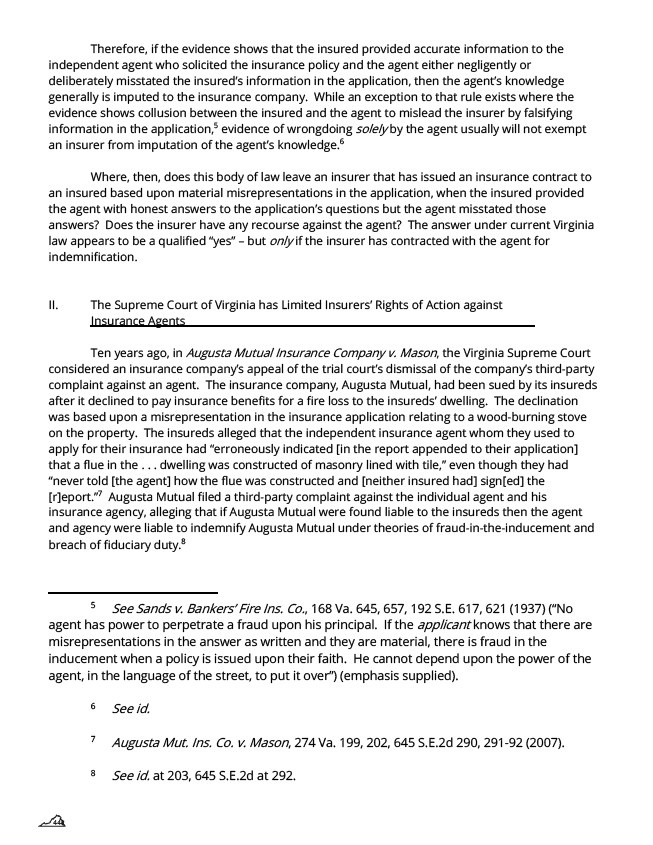
independent agent who solicited the insurance policy and the agent either negligently or
deliberately misstated the insured’s information in the application, then the agent’s knowledge
generally is imputed to the insurance company. While an exception to that rule exists where the
evidence shows collusion between the insured and the agent to mislead the insurer by falsifying
information in the application,5 evidence of wrongdoing solely by the agent usually will not exempt
an insurer from imputation of the agent’s knowledge.6
an insured based upon material misrepresentations in the application, when the insured provided
the agent with honest answers to the application’s questions but the agent misstated those
answers? Does the insurer have any recourse against the agent? The answer under current Virginia
law appears to be a qualified “yes” – but only if the insurer has contracted with the agent for
indemnification.
II. The Supreme Court of Virginia has Limited Insurers’ Rights of Action against
44
Therefore, if the evidence shows that the insured provided accurate information to the
Where, then, does this body of law leave an insurer that has issued an insurance contract to
Insurance Agents
- 3 -
Ten years ago, in Augusta Mutual Insurance Company v. Mason, the Virginia Supreme Court
considered an insurance company’s appeal of the trial court’s dismissal of the company’s third-party
complaint against an agent. The insurance company, Augusta Mutual, had been sued by its insureds
after it declined to pay insurance benefits for a fire loss to the insureds’ dwelling. The declination
was based upon a misrepresentation in the insurance application relating to a wood-burning stove
on the property. The insureds alleged that the independent insurance agent whom they used to
apply for their insurance had “erroneously indicated in the report appended to their application
that a flue in the . . . dwelling was constructed of masonry lined with tile,” even though they had
“never told the agent how the flue was constructed and neither insured had signed the
report.”7 Augusta Mutual filed a third-party complaint against the individual agent and his
insurance agency, alleging that if Augusta Mutual were found liable to the insureds then the agent
and agency were liable to indemnify Augusta Mutual under theories of fraud-in-the-inducement and
breach of fiduciary duty.8
5 See Sands v. Bankers’ Fire Ins. Co., 168 Va. 645, 657, 192 S.E. 617, 621 (1937) (“No
agent has power to perpetrate a fraud upon his principal. If the applicant knows that there are
misrepresentations in the answer as written and they are material, there is fraud in the
inducement when a policy is issued upon their faith. He cannot depend upon the power of the
agent, in the language of the street, to put it over”) (emphasis supplied).
6 See id.
7 Augusta Mut. Ins. Co. v. Mason, 274 Va. 199, 202, 645 S.E.2d 290, 291-92 (2007).
8
See id. at 203, 645 S.E.2d at 292.